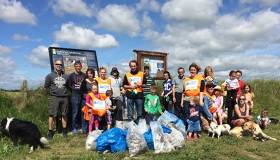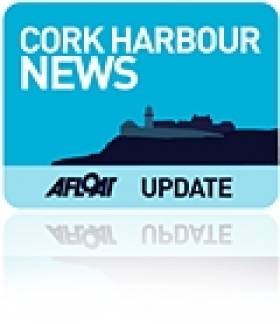Displaying items by tag: cleanup
East Cork Coast Cleaning at Ballynamona This Weekend
‘Clean Coasts Ballynamona’ will take their coast cleaning project to Ballynamona Beach near Shanagarry in East Cork this weekend.
On Sunday morning next, August 14, at 10 am. they will carry out a beach clean at Ballynamona.
‘Clean Coasts Ballynamona’ are An Taisce Ocean Hero winners for 2015/16 in the Best Newcomer section.
Proinsias Ó Tuama of the group says: “ It will last one hour. We will also be holding a Sandcastle competition as part of our morning’s activities for all the kids – both big and small. Prizes will be awarded for the best sandcastles. All are welcome.
“Our work continues for cleaner, safer beaches by the community in the East Cork Area.”
Clean Coasts’ Big Beach Clean Takes Place This Weekend
Clean Coasts’ Big Beach Clean is taking place this weekend 18th-20th of September all along the Irish coastline. Clean Coasts is teaming up with the International Ocean Conservancy once again for the International Coastal Cleanup event. Last year 560,000 volunteer in 91 countries removed 7,257 tonnes of marine litter from the world's oceans. This year thousands of volunteers will be participating in beach cleans nationwide and you can search for a clean up near you on our website www.cleancoast.org
Michael John O Mahony Director of An Taisce’s Environmental Education Unit said, “Each year millions of tonnes of litter enter our seas and oceans, resulting in environmental, economic, health and aesthetic challenges. The Clean Coasts programme is inviting volunteers to join this global coastal clean-up helping remove marine litter from our beautiful coastline and aid in the protection of our coastal habitats and marine life”.
During the Big Beach Clean, Clean Coasts’ volunteers are asked to carry out marine litter surveys to quantify the amount and types of litter on Irish beaches. These surveys are aimed at heightening awareness about the issue of marine litter and serve as an indicator of the magnitude of the problem.
Haulbowline Toxic Waste Site Will Be Cleaned Up by 2014 Says Govt
#CORK HARBOUR - The Government has finally set a deadline for the clean-up of the toxic waste site on Haulbowline Island in Cork Harbour, under threat of massive fines from the European Commission.
RTÉ News reports that a two-and-a-half year deadline has been set to complete the sanitation of the illegal dump on the island at the site of the former Irish Steel/Ispat plant.
Some 500,000 tonnes of waste, including toxic heavy metals and cancer-causing materials, have been blamed for the area's notoriety in having one of the highest cancer rates in Ireland.
As previously reported on Afloat.ie, in October last the Government signed off on a €40m package to begin clean-up of the toxic waste site on the island.
In an editorial yesterday, the Irish Examiner welcomed the Government's decision, but emphasised it was long overdue.
"[It] cannot dispel the great frustration that it has taken so very long to do what should have been done years ago," the paper said.
"To this day nobody has explained how an illegal dump of this scale was allowed to develop on a site that is not exactly secluded, remote or out of the public eye - it is, after all, just next door to the country’s main naval base."
The Irish Examiner also reports on worries that the toxic waste may never be fully removed from the island, but rather sealed off and made impermeable.
Minister for the Marine Simon Coveney was quoted as saying: "This whole clean-up plan will be peer reviewed so it’s best practice but it could be better to contain the material onsite rather than remove it.
"We will be doing all that is reasonable to ensure the site is safe."





























































